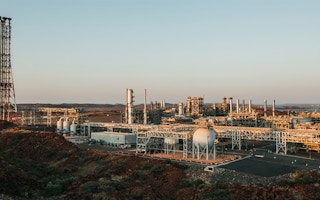Multinational banking heavyweights that have announced ambitious net-zero greenhouse gas emissions lending targets over the past 18 months have come under fire for supporting the development of a multi-billion dollar liquified natural gas (LNG) project in Australia.
To continue reading, subscribe to Eco‑Business.
There's something for everyone. We offer a range of subscription plans.
- Access our stories and receive our Insights Weekly newsletter with the free EB Member plan.
- Unlock unlimited access to our content and archive with EB Circle.
- Publish your content with EB Premium.
Banks including Japan’s Mitsubishi UFJ Financial Group (MUFG), United Overseas Bank (UOB) of Singapore, National Australia Bank (NAB) and United Kingdom-based Standard Chartered are lending US$3.49 billion to infrastructure investor Global Infrastructure Partners (GIP) for its acquisition of a stake in the Pluto LNG Train 2 gas processing facility in Western Australia.
Pluto LNG Train 2, which is an extension of the Pluto LNG facility which has been running since 2012, will be used to process gas sourced from the Scarborough offshore gas field, a greenfield site which is projected to produce 5 million tonnes of gas a year, and 1.6 billion tonnes of carbon emissions over its lifetime.
The expanded facility is slated to export its first LNG cargo in 2026, and is expected to supply mainly Asian markets. The other banks involved in the 18-party consortium include Bank of China, Japanese banks Mizuho and Sumitomo Mitsui Banking Corporation (SMBC), United Kingdom-headquartered HSBC, and Australia’s Westpac and Australia and New Zealand Bank (ANZ).
Market Forces campaigner Jack Bertolus said that the banks’ support for the Scarborough-Pluto project discredits their net-zero emissions pledges. All of the banks in the consortium — with the exception of Bank of China — have made decarbonisation commitments to mitigate the climate impact of their lending portfolios.
NAB announced a 2050 net-zero target last year, but was criticised by Market Forces for describing a loan awarded to the world’s largest coal export terminal in New South Wales last year as “sustainable”. NAB did not respond to Eco-Business’s queries about bankrolling the gas field.
ANZ said it does not comment on individual customer relationships, but pointed to its plan to cut the carbon intensity of its power generation lending portfolio by 50 per cent by 2030. The bank aims to back efforts to achieve net zero by 2050, but oil and gas projects are not included in its commitment.
MUFG, which committed in May to achieve net-zero emissions in its finance portfolio by 2050, declined to comment. The bank’s net-zero policy has drawn criticism for lacking detail.
HSBC told Eco-Business that it set out a detailed plan to phase out the financing of thermal coal-fired power in European Union and Organisation for Economic Co-operation and Development countries by 2030, and worldwide by 2040. “We will publish targets to align financing for the oil and gas and power and utilities sectors with the goals and timelines of the Paris Agreement in our 2021 annual report and accounts on 22 February 2022,” a spokesperson said.
HSBC declared in October 2020 that it would hit net zero by 2050 “or sooner”. Its coal lending phase-out followed a US$2.4 trillion investor campaign led by responsible investment non-profit ShareAction.
UOB, which runs a sustainability financing framework that encourages customers to get to net zero, said that it is “committed to responsible financing.” A UOB spokesperson told Eco-Business: “Our borrowers must adhere to our responsible financing policy and provide representations and warranties to demonstrate compliance, including with local ESG regulations in the countries in which they operate.”
SMBC declined to respond. The bank announced a roadmap to decarbonisation, including a 2050 net-zero target, in May last year. The bank has been under sustained pressure to stop coal lending in Japan and overseas, and in March last year signalled a halt to coal power funding.
Westpac said that bank “supports a net zero economy by 2050”, and noted that it was the first Australian bank to support the Paris Agreement. “We will support our existing customers and work with them to ensure they have Paris-aligned business strategies. We also expect any new oil and gas exploration, production and refining customers to have publicly disclosed Paris-aligned business goals,” a bank spokesperson said.
Westpac continues to draw criticism for funding new fossil fuels projects, including providing loans for Whitehaven Coal, an Australian coal mining company, and oil and gas producer, Beach Energy.
StanChart did not respond to Eco-Business’s request for comment. The company declared in October 2021 that it would be a net-zero bank by 2050. However, on Tuesday, Market Forces highlighted a US$400 million ‘sustainability-linked’ bond that StanChart has issued for SW Infrastructure, a company building a new 12 million tonne-a-year coal export terminal in India.
Bertolus pointed to a July 2021 report by energy think tank International Energy Agency that called for an end to the extraction of fossil fuels, including natural gas, in order to curb emissions to net-zero by 2050, in line with the Paris climate accord.
“The immensity of the [Scarborough-Pluto] fossil fuel project is matched only by the banks’ willingness to repeatedly con their customers and their investors, who are all demanding action on the climate crisis. In reality, their money is being used to fund a project enabling emissions equivalent to running 15 coal plants for three decades,” he said.
A report by a collective of NGOs titled Banking on climate chaos, published last March, showed that between 2016 and 2020, the five years since the Paris Agreement was signed, the 60 largest commercial and investment banks have collectively financed US$3.8 trillion in fossil fuel companies.
Mizuho, ANZ, MUFG, Westpac, HSBC, SMBC and StanChart have all increased their fossil fuel exposure over that time period, StanChart by the biggest margin. The only bank in the Scarborough-Pluto consortium to have reduced its post-Paris fossil fuels financing is NAB, the report found.

















